2004年11月CATTI三级笔译实务真题(附答案)
人事部翻译资格证书(CATTI)2004 年 11 月英语二级《笔译实务》试题及参考答案
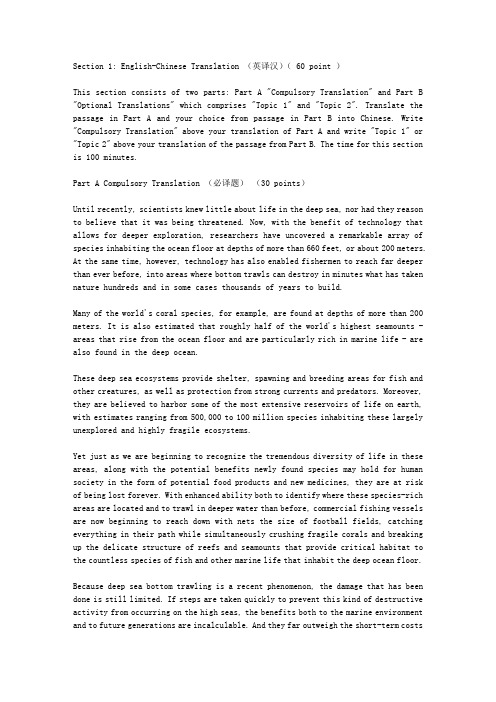
Section 1: English-Chinese Translation (英译汉)( 60 point )This section consists of two parts: Part A "Compulsory Translation" and Part B "Optional Translations" which comprises "Topic 1" and "Topic 2". Translate the passage in Part A and your choice from passage in Part B into Chinese. Write "Compulsory Translation" above your translation of Part A and write "Topic 1" or "Topic 2" above your translation of the passage from Part B. The time for this section is 100 minutes.Part A Compulsory Translation (必译题)(30 points)Until recently, scientists knew little about life in the deep sea, nor had they reason to believe that it was being threatened. Now, with the benefit of technology that allows for deeper exploration, researchers have uncovered a remarkable array of species inhabiting the ocean floor at depths of more than 660 feet, or about 200 meters. At the same time, however, technology has also enabled fishermen to reach far deeper than ever before, into areas where bottom trawls can destroy in minutes what has taken nature hundreds and in some cases thousands of years to build.Many of the world's coral species, for example, are found at depths of more than 200 meters. It is also estimated that roughly half of the world's highest seamounts - areas that rise from the ocean floor and are particularly rich in marine life - are also found in the deep ocean.These deep sea ecosystems provide shelter, spawning and breeding areas for fish and other creatures, as well as protection from strong currents and predators. Moreover, they are believed to harbor some of the most extensive reservoirs of life on earth, with estimates ranging from 500,000 to 100 million species inhabiting these largely unexplored and highly fragile ecosystems.Yet just as we are beginning to recognize the tremendous diversity of life in these areas, along with the potential benefits newly found species may hold for human society in the form of potential food products and new medicines, they are at risk of being lost forever. With enhanced ability both to identify where these species-rich areas are located and to trawl in deeper water than before, commercial fishing vessels are now beginning to reach down with nets the size of football fields, catching everything in their path while simultaneously crushing fragile corals and breaking up the delicate structure of reefs and seamounts that provide critical habitat to the countless species of fish and other marine life that inhabit the deep ocean floor.Because deep sea bottom trawling is a recent phenomenon, the damage that has been done is still limited. If steps are taken quickly to prevent this kind of destructive activity from occurring on the high seas, the benefits both to the marine environment and to future generations are incalculable. And they far outweigh the short-term coststo the fishing industry.Part B Optional Translations (二选一题)( 30 points )Topic 1 (选题一)Most of the world's victims of AIDS live - and, at an alarming rate, die - in Africa. The number of people living with AIDS in Africa was estimated at 26.6 million in late 2003. New figures to be published by the United Nations Joint Program on AIDS ( UNAIDS ), the special UN agency set up to deal with the pandemic, will probably confirm its continued spread in Africa, but they will also show whether the rate of spread is constant, increasing or falling.AIDS is most prevalent in Eastern and Southern Africa, with South Africa, Zimbabwe and Kenya having the greatest numbers of sufferers; other countries severely affected include Botswana and Zambia. AIDS was raging in Eastern Africa - where it was called "slim", after the appearance of victims wasting away - within a few years after its emergence was established in the eastern Congo basin; however, the conflicting theories about the origin of AIDS are highly controversial and politicized, and the controversy is far from being settled.Measures being taken all over Africa include, first of all, campaigns of public awareness and device, including advice to remain faithful to one sexual partner and to use condoms. The latter advice is widely ignored or resisted owing to natural and cultural aversion to condoms and to Christian and Muslim teaching, which places emphasis instead on self-restraint.An important part of anti- AIDS campaigns, whether organized by governments, nongovernmental organizations or both, is the extension of voluntary counseling and testing ( VCT ) .In addition, medical research has found a way to help sufferers, though not to cure them.Funds for anti- AIDS efforts are provided by the Global Fund to Fight AIDS, Tuberculosis and Malaria, a partnership between governments, civil society, the private sector and affected communities around the world; the fund was launched following a call by the UN Secretary-General in 2001. However, much more is needed if the spread of the pandemic is to be at least halted.Topic 2 (选题二)As a leader of a least developed country, I speak from experience when I say that poverty is too complex a phenomenon, and the strategies for fighting it too diverse and dependent on local circumstances, for there is no single silver bullet in the war on poverty.We have learned the hard way over the years. We have experimented with all kinds of ideas.Yet a report recently released by the World Economic Forum shows that barely a third of what should have been done by now to ensure the world meets its goals to fight poverty, hunger and disease by 2015 is done. I am now convinced that the Millennium Development Goals set by the United Nations in 2000 can only be attained through a global compact, anchored in national policies that take into account local circumstances.Aid and trade are both necessary, but they are not enough on their own. Neither is good governance enough in itself. Above all, nothing can move without the direct participation of local communities. I fear that we lecture too much. This is not the best way.I will give an example of how such a compact worked in Tanzania to achieve universal basic schooling.In the mid-1990s, almost all indicators for basic education were in free fall. The gross enrollment rate had fallen from 98 percent in the early 1980s to 77.6 percent in 2000. The net enrollment rate had likewise fallen, from over 80 percent to only 58.8 percent.Then several things happened. We decided at the top political level that basic education would be a top priority, and adopted a five-year Primary Education Development Plan to achieve universal basic education by 2006 - nine years ahead of the global target.Good governance produced more government revenues, which quadrupled over the last eight years. In 2001, we received debt relief under the World Bank's enhanced HIPC ( heavily indebted poor countries ) Initiative. Subsequently, more donors put aid money directly into our budget or into a pooled fund for the Primary Education Development Program ( PEDP ) .The government's political will was evidenced by the fact that over the last five years the share of the national budget going to poverty reduction rose by 130 percent. We abolished school fees in primary schools.Then we ensured that all PEDP projects are locally determined, planned, owned, implemented and evaluated. This gave the people pride and dignity in what they were doing. After only two years of implementing PEDP, tremendous successes have been achieved.Section 2: Chinese- English Translation (汉译英)( 40 point )This section consists of two parts: Part A "Compulsory Translation" and Part B "Optional Translations" which comprises "Topic 1" and "Topic 2".Translation the passage in Part A and your choice from passage in Part B into English. Write "Compulsory Translation" above your translation of Part A and write "Topic 1" or "Topic 2" above your translation of the passage from Part B. The time for this section is 80 minutes.Part A Compulsory Translation (必译题)( 20 points )进入新世纪,国际形势继续发生深刻复杂的变化。
2004年11月英语三级口译综合能力试题
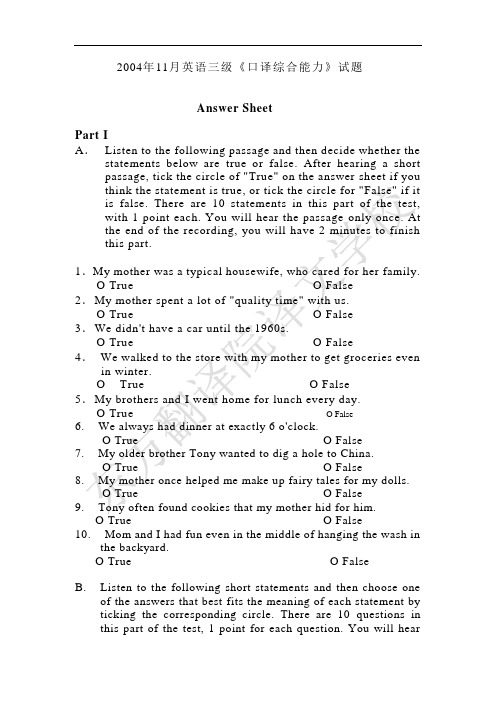
2004年11月英语三级《口译综合能力》试题Answer SheetPart IA.Listen to the follo wing passage and then decide whether the statements below are true or false. After hearing a short passage, tick the circle of "True" on the answer sheet if you think the statement is true, or tick the circ le for "False" if it is false. There are 10 statements in this part of the test, with 1 point each. You will hear the passage only once. At the end of the recording, you will have 2 minutes to finish this part.1.My mother was a typ ical housewife, who cared for her family.O True O False2.My mother spent a lot of "quality time" with us.O True O False3.We didn't have a car until the 1960s.O True O False4.We walked to the store with my mother to get groceries even in winter.O True O False5.My brothers and I went home for lunch every day.O True O False6. We always had dinner at exactly 6 o'clock.O True O False7. My older brother Tony wanted to dig a hole to China.O True O False8. My mother once helped me make up fairy tales for my dolls.O True O False9. Tony often found cookies that my mother hid for him.O True O False10. Mom and I had fun even in the middle of hanging the wash inthe backyard.O True O FalseB. Listen to the following short statements and then choose oneof the answers that best fits the meaning of each statement by ticking the corresponding circle. There are 10 questions in this part of the test, 1 point for each question. You will hearthe statement only once.11.Which of the following can best describe his situation?a. Hurt.b. Scared.c. Dumbfounded. d. Ruined.12. Why didn't I do the job?a. Because it would be too time-consuming.b. Because I wanted to do it myself.c. Because nobody had done it before.d. Because nobody joined me.13. What could he do for the rest of his life?a. Nothing.b. Be a councilman.c. Reconsider his life.d. Be a humble clerk.14. Which of the following is closest in meaning to what you've just heard?a. I have no doubt that she will type her paper tomorrow.b. No one believes that she is a good typist.c. I didn't know she had so many pages to type tomorrow.d. It seems that she won't be able to complete her typing bytomorrow morning.15. What do we know about Susan?a. She learned Spanish in America.b. She doesn't know Spanish.c. She improved her Spanish in Mexico.d. She knew Spanish before going to Mexico.16. Which of the following is true about the politician?a. He had proposed the same policy 2 years before the speech.b. He did mention his old advocacy in his speech.c. There was no time for the politician to talk about his advocacy.d. His speech was just the opposite of what he had advocated 2years before.17. What happened to train travel?a. Trains were stuck in the snow.b. People couldn't get train tickets.c. Many people had to stand on the train.d. Train travel was suspended because of severe snowstorm.18. What happened to him after the World Tennis Touruament?a. He became famous.b. He joined the airlines industry.c. He had habitual headaches.d. He became a hair stylist.19. What is bound to happen if a judge is not capable of his work?a. Injustice.b. He would be displaced.c. He would be dismissed. d. Miscarriage.20. How is the weather like?a. Good enough for outing.b. Bad.c. Not as good as it was a while ago.d. It's getting better.Part IIListen to the following passages and then choose the best answer to each question by ticking the corresponding circle. You may need to scribble a few notes in order to answer the questions satisfactorily. There are 3 passages in this part, each with 5 questions. And each question carries 2 points. You will hear the passages only once. At the end of each passage, you will have 2 minutes to finish the questions.Passage One21. What did I do in Washington?a. I worked in a drugstore.b. I worked in a copy room.c. I did research about my family.d. I worked in a library.22. What did I find out on the paper left by a customer?a. His family tree.b. My mother's family tree.c. My grandmother's family tree.d. My father's family tree.23. How did I find the man who left the paper?a. He came back for the paper.b. He came back for more copying.c. He came to me.d. He invited me to his home.24. How were Frank and I connected?a. My grandmother and his grandmother were sisters.b. We were first cousins once removed.c. We were second cousins once removed.d. My great-grandmother and his great-grandmother weresisters.25. How many children did Frank have?a. 8.b. 4.c. 10.d. Don't know.Passage Two26. When did a mass move to the suburbs begin in the U.S.?a. In the 1960s.b. In the 1940s.c. In the 1970s.d. In the 1950s.27. What kind of people moved to the suburbs?a. Middle-class people.b. The rich.c. The poor.d. The young.28. What happened to the city after the mass move?a. Housing costs decreased.b. Crime rate was much lower than before.c. All business moved out.d. Cities declined.29. What happened to businesses after the mass move?a. They established branches in suburbs.b. They scattered here and there in cities.c. Some bigger companies moved out.d. They lost many employees.30. What does the speaker think of the movement to the suburbs?a. People may miss the cultural life in cities.b. The movement is still developing.c. It satisfies man's need to live and work in an idealenvironment.d. People may like the companionship in suburbs.Passage Three31. Which city got the most room reservatio ns last summer?a. Orlando.b. Honolulu.c. Las Vegas.d. Boston.32. Why is Las Vegas so successful in attracting tourists?a. Because of gambling.b. Because it is an alternative family destination.c. Because the hotels are quite cheap.d. Because people like the desert.33. Which city ranked No. 2 in room reservations last summer?a. San Francisco.b. Las Vegas.c. Orlando.d. New York.34. Which of the following cities' room reservations wereinfluenced by the Iraq War?a. Boston.b. Paris.c. Miami.d. London.35. What is the expectation of overall summer travel this year?a. A 2.5 % rise.b. It would rise along with international touris m.c. A 28 % rise.d. Patriotism would not be a theme in travel market.Part IIIParts of the following text are missing. While listening to the tape, complete the passage by filling in each blank space with an appropriate word or words. There are 20 blanks, each carrying 1 point. You will hear the passage only once. At the end of the recording,you will have 3 minutes to finish this part.Beijing: The United States and North Korea had their firstin four months here this afternoon as part of the negotiations on how to end North Korea's nuclear program, but diplomats played down prospects for JamesA.Kelly,assistant and Kim Yong Ⅱ, North Korea's deputy foreign minister, met of formal discussions, on direct dialogue that began after a stormy meeting in which North Korea warned that it was moving quickly to nuclear arms.The Bush administration had insisted that it would only hold talks with North Koreabecause,it argued,only pressure would persuade North Korea to . It got its way when North Korean dropped its insistence on and agreed,after extensive efforts by China, to hold unusual simultaneous negotiations with , , and as well as the United States.Though Bush administration officials had notTalking privately with the North Koreans during , the fact that Mr.Kelly and Mr.Kim met on the first day was seen as。
2004年11月CATTI三级口译实务真题
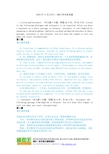
模考吧网提供最优质的模拟试题,最全的历年真题,最精准的预测押题!2004年11月CATTI 三级口译实务真题一、Listen and Interpret (本大题1小题.每题20.0分,共20.0分。
Listen to the following dialogue and interpret it as required. After you hear a sentence or a short passage in Chinese, interpret it into English by speaking to the microphone. And after you hear an English sentence or short passage, interpret it into Chinese. You will hear the signal to tell you when you start interpreting )第1题【正确答案】:A :Traveling is commonplace in China these days .If a Chinese person travels within the country ,besides of course bringing money or credit card ,he has to bring his ID card with him .B :对,的确如此。
身份证是政府颁发的证明一个人身份的最权威的证明。
在国内旅行时很有用。
而且,我知道在中国还不能用驾照来证明身份。
A :That's true .Compared with the huge population of China ,the number of driving license holders is still small .China began to issue ID cards to its citizens in 1985.Now more than 800 million residents of the country have one .B :身份证发给十六岁或以上公民。
2004年11月口译三级综合能力真题试卷(题后含答案及解析)
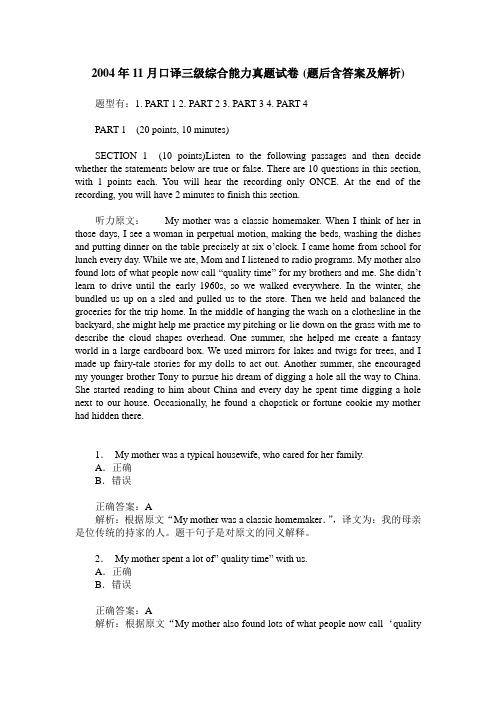
2004年11月口译三级综合能力真题试卷(题后含答案及解析)题型有:1. PART 1 2. PART 2 3. PART 3 4. PART 4PART 1 (20 points, 10 minutes)SECTION 1 (10 points)Listen to the following passages and then decide whether the statements below are true or false. There are 10 questions in this section, with 1 points each. You will hear the recording only ONCE. At the end of the recording, you will have 2 minutes to finish this section.听力原文:My mother was a classic homemaker. When I think of her in those days, I see a woman in perpetual motion, making the beds, washing the dishes and putting dinner on the table precisely at six o’clock. I came home from school for lunch every day. While we ate, Mom and I listened to radio programs. My mother also found lots of what people now call “quality time” for my brothers and me. She didn’t learn to drive until the early 1960s, so we walked everywhere. In the winter, she bundled us up on a sled and pulled us to the store. Then we held and balanced the groceries for the trip home. In the middle of hanging the wash on a clothesline in the backyard, she might help me practice my pitching or lie down on the grass with me to describe the cloud shapes overhead. One summer, she helped me create a fantasy world in a large cardboard box. We used mirrors for lakes and twigs for trees, and I made up fairy-tale stories for my dolls to act out. Another summer, she encouraged my younger brother Tony to pursue his dream of digging a hole all the way to China. She started reading to him about China and every day he spent time digging a hole next to our house. Occasionally, he found a chopstick or fortune cookie my mother had hidden there.1.My mother was a typical housewife, who cared for her family.A.正确B.错误正确答案:A解析:根据原文“My mother was a classic homemaker.”,译文为:我的母亲是位传统的持家的人。
全国翻译资格考试三级笔译实务历年真题汉译英分级译文解码(简化版)
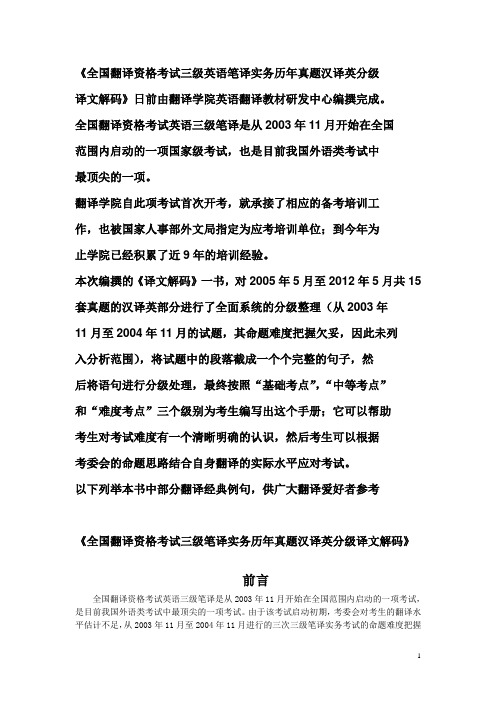
《全国翻译资格考试三级英语笔译实务历年真题汉译英分级译文解码》日前由翻译学院英语翻译教材研发中心编撰完成。
全国翻译资格考试英语三级笔译是从2003年11月开始在全国范围内启动的一项国家级考试,也是目前我国外语类考试中最顶尖的一项。
翻译学院自此项考试首次开考,就承接了相应的备考培训工作,也被国家人事部外文局指定为应考培训单位;到今年为止学院已经积累了近9年的培训经验。
本次编撰的《译文解码》一书,对2005年5月至2012年5月共15 套真题的汉译英部分进行了全面系统的分级整理(从2003年11月至2004年11月的试题,其命题难度把握欠妥,因此未列入分析范围),将试题中的段落截成一个个完整的句子,然后将语句进行分级处理,最终按照“基础考点”,“中等考点”和“难度考点”三个级别为考生编写出这个手册;它可以帮助考生对考试难度有一个清晰明确的认识,然后考生可以根据考委会的命题思路结合自身翻译的实际水平应对考试。
以下列举本书中部分翻译经典例句,供广大翻译爱好者参考《全国翻译资格考试三级笔译实务历年真题汉译英分级译文解码》前言全国翻译资格考试英语三级笔译是从2003年11月开始在全国范围内启动的一项考试,是目前我国外语类考试中最顶尖的一项考试。
由于该考试启动初期,考委会对考生的翻译水平估计不足,从2003年11月至2004年11月进行的三次三级笔译实务考试的命题难度把握欠妥。
因此,我们在整理历年真题时将这三次的试题没有列在我们的试题分析范围内。
我们从2005年5月至2012年5月共15套真题的汉译英部分进行了全面系统的分级整理,将试题中的段落截成一个个完整的语句,然后将句子进行分级处理,最终按照“基础考点”,“中等考点”和“难度考点”三个级别为考生编写出这个手册--《全国翻译资格考试三级笔译实务历年真题汉译英分级译文解码》。
这个手册可以使考生对考试的难度有一个比较清晰明确的认识。
这样,我们的考生就可以根据考委会命题的思路与难度的要求做到心中有数并根据自身翻译的实际水平应对考试。
2004三级笔译
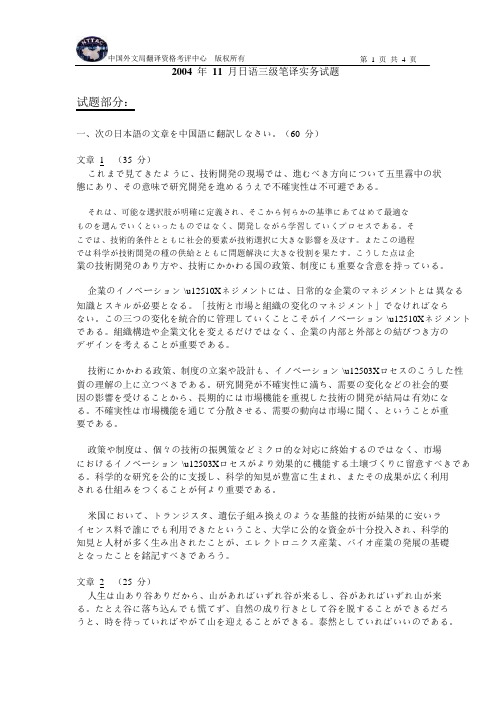
2004年11月日语三级笔译实务试题试题部分:一、次の日本語の文章を中国語に翻訳しなさい。
(60 分)文章 1 (35 分)これまで見てきたように、技術開発の現場では、進むべき方向について五里霧中の状態にあり、その意味で研究開発を進めるうえで不確実性は不可避である。
それは、可能な選択肢が明確に定義され、そこから何らかの基準にあてはめて最適なものを選んでいくといったものではなく、開発しながら学習していくプロセスである。
そこでは、技術的条件とともに社会的要素が技術選択に大きな影響を及ぼす。
またこの過程では科学が技術開発の種の供給とともに問題解決に大きな役割を果たす。
こうした点は企業の技術開発のあり方や、技術にかかわる国の政策、制度にも重要な含意を持っている。
企業のイノベーション·\u12510Xネジメントには、日常的な企業のマネジメントとは異なる知識とスキルが必要となる。
「技術と市場と組織の変化のマネジメント」でなければならない。
この三つの変化を統合的に管理していくことこそがイノベーション·\u12510Xネジメントである。
組織構造や企業文化を変えるだけではなく、企業の内部と外部との結びつき方のデザインを考えることが重要である。
技術にかかわる政策、制度の立案や設計も、イノベーション·\u12503Xロセスのこうした性質の理解の上に立つべきである。
研究開発が不確実性に満ち、需要の変化などの社会的要因の影響を受けることから、長期的には市場機能を重視した技術の開発が結局は有効になる。
不確実性は市場機能を通じて分散させる、需要の動向は市場に聞く、ということが重要である。
政策や制度は、個々の技術の振興策などミクロ的な対応に終始するのではなく、市場におけるイノベーション·\u12503Xロセスがより効果的に機能する土壌づくりに留意すべきである。
科学的な研究を公的に支援し、科学的知見が豊富に生まれ、またその成果が広く利用される仕組みをつくることが何より重要である。
11月catti三级笔译实务真题(附答案)
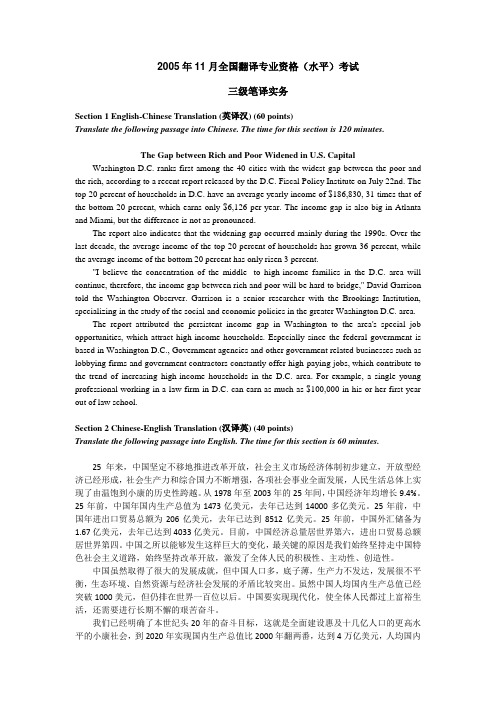
2005年11月全国翻译专业资格(水平)考试三级笔译实务Section 1 English-Chinese Translation (英译汉) (60 points)Translate the following passage into Chinese. The time for this section is 120 minutes.The Gap between Rich and Poor Widened in U.S. Capital Washington D.C. ranks first among the 40 cities with the widest gap between the poor and the rich, according to a recent report released by the D.C. Fiscal Policy Institute on July 22nd. The top 20 percent of households in D.C. have an average yearly income of $186,830, 31 times that of the bottom 20 percent, which earns only $6,126 per year. The income gap is also big in Atlanta and Miami, but the difference is not as pronounced.The report also indicates that the widening gap occurred mainly during the 1990s. Over the last decade, the average income of the top 20 percent of households has grown 36 percent, while the average income of the bottom 20 percent has only risen 3 percent."I believe the concentration of the middle- to high-income families in the D.C. area will continue, therefore, the income gap between rich and poor will be hard to bridge," David Garrison told the Washington Observer. Garrison is a senior researcher with the Brookings Institution, specializing in the study of the social and economic policies in the greater Washington D.C. area.The report attributed the persistent income gap in Washington to the area's special job opportunities, which attract high-income households. Especially since the federal government is based in Washington D.C., Government agencies and other government related businesses such as lobbying firms and government contractors constantly offer high-paying jobs, which contribute to the trend of increasing high-income households in the D.C. area. For example, a single young professional working in a law firm in D.C. can earn as much as $100,000 in his or her first year out of law school.Section 2 Chinese-English Translation (汉译英) (40 points)Translate the following passage into English. The time for this section is 60 minutes.25年来,中国坚定不移地推进改革开放,社会主义市场经济体制初步建立,开放型经济已经形成,社会生产力和综合国力不断增强,各项社会事业全面发展,人民生活总体上实现了由温饱到小康的历史性跨越。
11月翻译资格考题三级英语笔译实务试卷

11月翻译资格考题三级英语笔译实务试卷Section 1:英译汉(50 分)This month, the United Nations Development Program made water and sanitation the centerpiece of its flagship publication, the Human Development Report.Claims of a "water apartheid," where poor people pay more for water than the rich, are bound to attract attention. But what are the economics behind the problem, and how can it be fixed? In countries that have trouble delivering clean water to their people, a lack of infrastructure is often the culprit. People in areas that are not served by public utilities have to rely on costlier ways of getting water, such as itinerant water trucks and treks to wells. Paradoxically, as the water sources get costlier, the water itself tends to be more dangerous. Water piped by utilities - to the rich and the poor alike - is usually cleaner than water trucked in or collected from an outdoor tank.The problem exists not only in rural areas but even in big cities, said Hakan Bjorkman, program director of the UN agency in Thailand. Further, subsidies made tolocal water systems often end up benefiting people other than the poor, he added.The agency proposes a three-step solution. First, make access to 20 liters, or 5 gallons, of clean water a day a human right. Next, make local governments accountable for delivering this service. Last, invest in infrastructure to link people to water mains.The report says governments, especially in developing countries, should spend at least 1 percent of gross domestic product on water and sanitation. It also recommends that foreign aid be more directed toward these problems. Clearly, this approach relies heavily on government intervention, something Bjorkman readily acknowledged. But there are some market-based approaches as well.By offering cut-rate connections to poor people to the water mainline, the private water utility in Abidjan, Ivory Coast, has steadily increased access to clean water, according to the agency's report. A subsidy may not even be necessary, despite the agency's proposals, if a country can harness the economic benefits of providing clean water.People who receive clean water are much less likely to die from water-borne diseases - a common malady in the developing world - and much more likely to enjoy long, productive, taxpaying lives that can benefit their host countries. So if a government is trying to raise financing to invest in new infrastructure, it might find receptive ears in private credit markets - as long as it can harness the return. Similarly, private companies may calculate that it is worth bringing clean water to an area if its residents are willing to pay back the investment over many years.In the meantime, some local solutions are being found. In Thailand, Bjorkman said, some small communities are taking challenges like water access upon themselves. "People organize themselves in groups to leverage what little resources they have to help their communities," he said. "That's especially true out in the rural areas. They invest their money in revolving funds and saving schemes, and they invest themselves to improve their villages. "It is not always easy to take these solutions and replicate them in other countries, though. Assembling a broad menu of differentapproaches can be the first step in finding the right solution for a given region or country.Section 2:汉译英(50 分)即使遇到丰收年景,对中国来说,要用世界百分之七的耕地养活全球五分之一的人口仍是一项艰巨的任务。
- 1、下载文档前请自行甄别文档内容的完整性,平台不提供额外的编辑、内容补充、找答案等附加服务。
- 2、"仅部分预览"的文档,不可在线预览部分如存在完整性等问题,可反馈申请退款(可完整预览的文档不适用该条件!)。
- 3、如文档侵犯您的权益,请联系客服反馈,我们会尽快为您处理(人工客服工作时间:9:00-18:30)。
2004年11月英语三级笔译实务试题Section 1 English-Chinese T ranslation (英译汉) (60 points)Translate the following passage into Chinese. The time for this section is 120 minutes.A few weeks back, I asked a 14-year-old friend how she was coping with school.Referring to stress, she heaved a big sigh and said: "Aiyah, anything bad that can happen has already happened."Her friends nearby then started pouring out their woes about which subjects they found hard, and so on. Pessimism again, in these all-too-familiar remarks about Singapore's education system, widely regarded as too results-oriented, and! wonder why I even bothered to ask.The school system of reaching for A's underlies the country's culture, which emphasizesthe chase for economic excellence where wealth and status are must-haves.Such a culture is hard to change.So when I read of how the new Remaking Singapore Committee had set one of its goals as challenging the traditional roads to success, encouraging Singaporeans to realize alternative careers in the arts, sports, research or as entrepreneurs, I had my doubts about its success in this area, if not coupled with help from parents themselves.The new Remaking Singapore Committee is a brainchild of the Singaporean Prime Minister, formed to make Singaporeans look beyond the five C's: cash, condos, clubs, credit cards and cars, to help prepare the nation for the future.It is good that the government wants to do something about the country's preoccupation with material success. But it will be a losing battle if the family unit itself is not involved because I believe the committee's success is rooted in a revamp of an entire culture built from 37 years of independence.This makeover has to start with the most basic societal unit -- the family.Parents should not drown their children in mantras of I-want-hundred-marks. Tuition lessons are not the be-all and end-all of life. And a score of 70 for a Chinese paper is definitely not the end of life.If ever I become a parent, I will bring my children camping. I will show them that cooking food in a mess tin over a campfire is fun. I will teach them that there is nothing dirty about lying on a sleeping bag over grass.In fact, it is educational because Orion is up there in the night sky with all the other bright stars whose shapes and patterns tell something more than a myth. For instance, they give directions to the lost traveler, I will say.And who knows, my child may become an astronomer years down the road. All because of the nights I spent with him watching the twinkles in the sky.That's my point. Parents should teach their children that there's more to life than studies. Better still if the nation's leaders echo that idea as well.This way, when their children aspire to be the next Joscelin Yeo, they won't feel like they are fighting a losing battle against a society that holds doctors and lawyers in awe.However, the culture that babysits economic excellence is deeply ingrained and so are the mindsets of many parents. But parents can take the cue from the new Remaking SingaporeCommittee and be aware of giving their children the right kind of education.It is now wait-and-see if, say, 10 years down the road, more would choose alternative careers. Hopefully, by then no one would think sportsmen or musicians as making too big a sacrifice in chasing their dreams.Section 2 Chinese-English T ranslation (汉译英) (40 points)Translate the following passage into English. The time for this section is 60 minutes.近年来,中国政府倡导国内旅游,推行“假日经济”政策,给公民每年3次为期一周的长假,让他们将更多储蓄用于旅游、购物和外出就餐。
2004年,五一节的总旅游消费达390亿元人民币。
目前旅游业收入占国内生产总值的2.3%。
预计到2013年,旅游收入将每年增长10%,并创造4,000万个就业机会。
旅游的间接效益更大,估计创造了1,840亿美元的经济活动,以及5,400万个就业岗位。
这些经济活动包括政府花在会议上的旅游开支,以及重要的旅游项目投资。
中国在公路、火车站和机场方面投资巨大。
新航线和公交公司不断涌现,竞争降低了旅游成本。
京沪间单程机票售价为850—900元人民币,有时还会更低。
一些航线开展网上售票服务,方便人们购票。
更多私车和汽车租赁中介的出现让数百万人不仅能跟团旅游,还能自己开车出游。
参考答案:Part 1 英译汉(60分)几个星期前,我问一个14岁的朋友,在学校的学习情况。
谈到压力的问题,她叹了一口气后说:“唉呀,所有可以发生的坏事,都已经发生了。
”她身旁的朋友这时也开始埋怨学习上面对的问题。
例如,哪些科目特别难掌握等。
当然,全是一些耳熟能详,批评我们的教育制度过于强调成绩的悲观看法。
我真有点后悔为什么要提起这个问题。
我们的学校制度要求学生争取一连串的A,因为我们的文化价值观强调卓越的经济成长,金钱和地位是每一个人追求的目标。
这是种根深蒂固和难以改变的观念。
在报章上读到,不久前成立的“改造新加坡委员会”的目标之一,是重新思考迈向成功的传统途径,鼓励国人从事文化、体育、和科研工作及创业。
不过,如果委员会无法争取到为人父母者的合作,我怀疑它在这方面能够取得多少成果。
委员会是吴作栋总理的建议,目的是要国人把目光放远,不要局限于所谓的5C,即金钱、共管公寓、俱乐部会员证、信用卡和车子,齐心合力为国家的未来做好准备。
政府想要改变国人功利和物质主义至上的思想,当然是件好事。
但是,如果不能取得家长的支持,那肯定就像是在打一场必败之仗。
我认为,委员会要取得成功,必须将我们独立后37年来所建立的文化价值观,改头换面。
